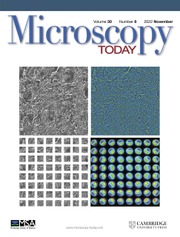Crossref Citations
This article has been cited by the following publications. This list is generated based on data provided by
Crossref.
Talamantes-Silva, M.A.
Rodríguez, A.
Talamantes-Silva, J.
Valtierra, S.
and
Colás, Rafael
2008.
Characterization of an Al–Cu cast alloy.
Materials Characterization,
Vol. 59,
Issue. 10,
p.
1434.
Talamantes-Silva, M.A.
Rodríguez, A.
Talamantes-Silva, J.
Valtierra, S.
and
Colás, R.
2008.
Effect of Solidification Rate and Heat Treating on the Microstructure and Tensile Behavior of an Aluminum-Copper Alloy.
Metallurgical and Materials Transactions B,
Vol. 39,
Issue. 6,
p.
911.
Radwański, Krzysztof
Wrożyna, Andrzej
and
Kuziak, Roman
2015.
Role of the advanced microstructures characterization in modeling of mechanical properties of AHSS steels.
Materials Science and Engineering: A,
Vol. 639,
Issue. ,
p.
567.
Papula, Suvi
Anttila, Severi
Talonen, Juho
Sarikka, Teemu
Virkkunen, Iikka
and
Hänninen, Hannu
2016.
Strain hardening of cold-rolled lean-alloyed metastable ferritic-austenitic stainless steels.
Materials Science and Engineering: A,
Vol. 677,
Issue. ,
p.
11.
Britz, D.
Webel, J.
Gola, J.
and
Mücklich, F.
2017.
A Correlative Approach to Capture and Quantify Substructures by Means of Image Registration.
Practical Metallography,
Vol. 54,
Issue. 10,
p.
685.
Britz, Dominik
Steimer, Yannik
and
Mücklich, Frank
2019.
100 Years of E04 Development of Metallography Standards.
p.
130.
Yurchenko, A. N.
Simonov, Yu. N.
and
Efimova, O. V.
2020.
Determination of the Complex Structure of Structural Steel by the Method of Color Etching.
Metal Science and Heat Treatment,
Vol. 61,
Issue. 9-10,
p.
622.
Vaško, Alan
2022.
Advantages of colour etching in quality control of graphitic cast irons.
Production Engineering Archives,
Vol. 28,
Issue. 4,
p.
319.
Renkó, József Bálint
and
Szabó, Péter János
2022.
Investigation of the Effect of Over-Etching During Color Etching.
Acta Materialia Transylvanica,
Vol. 5,
Issue. 1,
p.
29.
Demeneghi, Gabriel
Rodgers, Kristina
Hua Su, Ching
Medders, William M.
Gorti, Sridhar
and
Wilkerson, Ryan
2022.
Root cause analysis of premature simulated life cycle failure of friction stir welded aluminum 2219.
Engineering Failure Analysis,
Vol. 134,
Issue. ,
p.
106059.
Schnarr, H.
2024.
Less is sometimes more – some examples of the reduction of hazardous substances in metallographic etching.
Practical Metallography,
Vol. 61,
Issue. 7,
p.
420.
Schnarr, H.
2024.
Potential applications for modified Klemmsolutions.
Practical Metallography,
Vol. 61,
Issue. 7,
p.
447.
Sordetti, F.
Palombi, A.
Varone, A.
Picco, N.
Magnan, M.
Marin, E.
Maranzana, C.
and
Lanzutti, A.
2024.
Experimental review and accuracy of etchants used for phase analysis of SAF2507 Super Duplex Stainless Steel.
Journal of Materials Research and Technology,
Vol. 32,
Issue. ,
p.
3842.


